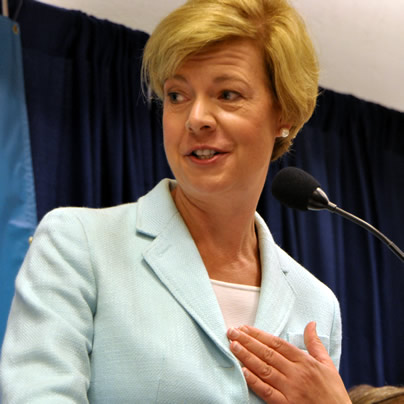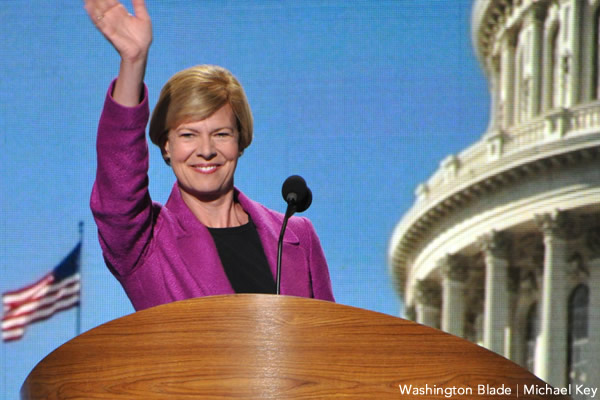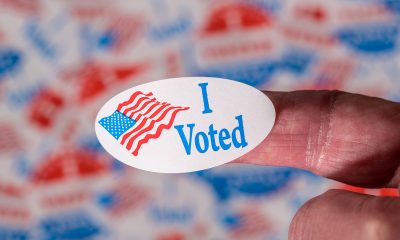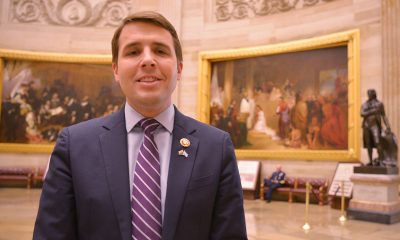National
Baldwin makes history with Senate victory in Wis.
Becomes first openly gay U.S. senator


Senator-elect Tammy Baldwin defeated former Wisconsin Gov. Tommy Thompson this week. (Washington Blade file photo by Michael Key)
In an historic first, lesbian Rep. Tammy Baldwin won her race for the U.S. Senate from Wisconsin Tuesday night, becoming the first openly gay person to serve in the Senate.
With 99 percent of precincts reporting Wednesday morning, Baldwin was ahead of former Wisconsin Gov. Tommy Thompson by a 51 percent to 46 percent margin.
“I am honored and humbled and grateful,” Baldwin said in election night remarks. “And I am ready to get to work, ready to stand with President Barack Obama, ready to fight for Wisconsin’s middle class!”
LGBT organizations throughout the country hailed Baldwin’s victory as an important milestone in the LGBT rights movement.
“This is a historic victory not only for the people of Wisconsin, but for lesbian, gay, bisexual and transgender Americans across the country who have finally gained an authentic and powerful voice in Congress’ upper chamber,” said Chuck Wolf, president and CEO of the Gay and Lesbian Victory Fund, which provided financial support for Baldwin’s campaign.
“Tonight Tammy shattered a glass ceiling that has existed for more than two centuries, and we could not be more thrilled,” Wolf said.
Baldwin’s supporters in Wisconsin noted that she also broke another barrier by becoming the first woman to be elected to the U.S. Senate from Wisconsin.
Chad Griffin, president of the Human Rights Campaign, which also provided financial support and field workers to assist Baldwin’s campaign, said Baldwin succeeded in drawing support from voters on a wide range of issues.
“With a relentless focus on the issues that matter to most Wisconsin voters – economic security, access to healthcare and fairness and inclusion for all,” Griffin said, “she’s earned the respect of all her constituents, gay and straight.”
As of Wednesday afternoon, the election division of the Wisconsin Government Accountability Board, which runs the state’s elections, reported that Baldwin received 1,533,868 votes, or 51 percent of the total. The board reported that Thompson received 1,370,664 votes, at 46 percent.
Two other candidates received a combined total of 3 percent of the vote, the board reported.
Early polls showed Thompson with a slight lead over Baldwin shortly after Thompson won the GOP nomination in a primary in August. By the middle of September, polls showed Baldwin in the lead, but the size of her lead narrowed by late October, with some pollsters saying the two candidates were in a statistical tie going into Tuesday’s election.
Baldwin’s quest to become the nation’s first openly gay U.S. senator captured the attention of the LGBT people across the country, many of whom contributed money to Baldwin’s campaign.
She also received backing from the Democratic Senatorial Campaign Committee and other Democratic leaning groups, including labor unions, environmental organizations and the women’s advocacy group Emily’s List.
In 1998, Baldwin became the first openly gay non-incumbent to win election to the U.S. House when she won her race for Wisconsin’s Second Congressional District in which the state capital of Madison is located.
In her seven terms in Congress, Baldwin became known as one of the strongest advocates of LGBT rights in the House as well as one of the strongest champions of progressive causes and policies.
Thompson, whose supporters describe him as a moderate, served as governor of Wisconsin between 1987 and 2001. He served as Secretary of the U.S. Department of Health and Human Services in the Bush administration from 2001 to 2005. He became a candidate for the Republican presidential nomination in 2008 but dropped out of the race before the start of the primaries.
Thompson has said he personally opposes same-sex marriage and supports the Defense of Marriage Act, which defines marriage under federal law as a union only between a man and a woman. But he has said he doesn’t favor a constitutional amendment to ban marriage equality and favors leaving same-sex marriage decisions to the states.
He has said he opposes workplace discrimination based on someone’s sexual orientation but has not said whether he would support federal legislation to ban anti-LGBT discrimination in the workplace.
Although Wisconsin members of the gay Republican group Log Cabin Republicans supported Thompson, the national Log Cabin organization, which endorsed GOP presidential candidate Mitt Romney for president, didn’t endorse Thompson.
“We endorsed candidates that engaged with us and asked for our endorsement,” said Log Cabin president R. Clarke Cooper, who noted that the group endorsed just four U.S. Senate candidates this year.
The outcome of Tuesday’s Senate election in Wisconsin marked the end of a bruising campaign, which the Milwaukee Journal Sentinel says may have broken a national record for the most negative TV ads of any U.S. Senate campaign in the state and possibly in the nation.
The Journal Sentinel reports that both Baldwin and Thompson appear to have lashed out at each other with equal force, with some independent observers saying some of the ads from both sides included misleading information.
None of the Thompson attack ads appear to have singled out Baldwin based on her sexual orientation.
However, in at least one instance, a Thompson campaign official sent an email to the news media in early September, one day before Baldwin spoke before the Democratic National Convention in Charlotte, N.C., highlighting Baldwin’s appearance at an LGBT Pride festival in Madison several years earlier.
The email, sent by Thompson campaign staffer Brian Nemoir, included an attached YouTube video showing Baldwin waiving her arms while dancing on a stage with the popular Wisconsin rock band V05. Some of the band members were dressed in Wonder Woman costumes as the band played the theme song for the Wonder Woman TV series.
Nemoir stated in his email that Baldwin was scheduled to discuss “heartland values” in her Democratic Convention speech.
“Clearly, there’s no one better positioned to talk ‘heartland values’ than Tammy,” he said sarcastically in the email.
Baldwin supporters called the email a form of gay baiting, saying it was an attempt to question Baldwin’s values because she appeared at an LGBT Pride event. A Thompson campaign spokesperson said Nemoir was acting as an individual and not on behalf of the campaign when he sent the email and video.
While the Thompson campaign’s negative TV ads steered clear of Baldwin’s sexual orientation, they sought to portray her as an ultra liberal politician out of touch with the needs of the state and the country.
One ad pointed to Baldwin’s longstanding support for a single payer health insurance system, quoting her as saying several years ago that the single payer system she supported is a “government takeover of medicine.” Another ad noted that Baldwin voted four times against economic sanctions for Iran, criticizing her judgment on a key foreign policy issue.
Baldwin responded to the health insurance attack by saying she voted for and continues to support the Affordable Care Act, President Obama’s health insurance reform measure that Congress passed two years ago. She said her support for a single payer system was “moot” since the Obama measure is about to be implemented.
She said she voted against sanctions for Iran at a time when she was hopeful that dissident groups in Iran would overturn Iran’s government and establish a true democratic system. She said she began voting for sanctions after determining that the opposition forces didn’t have the strength to change the government.
A Thompson campaign attack ad that drew expressions of outrage from Baldwin’s campaign and its supporters showed video footage of the devastation of the World Trade Center in New York following the Sept. 11, 2001 terrorist attacks and denounced Baldwin for voting against a 2006 House resolution honoring victims of the attacks.
Baldwin said she voted for at least four other 9/11 resolutions honoring victims of the terrorist attacks but voted against the 2006 resolution because it included other provisions on unrelated issues with which she disagreed.
In her own TV ads, Baldwin fired back at Thompson, citing reports by New York firefighters saying the U.S. Department of Health and Human Services, which Thompson headed at the time of the 9/11 attacks, was slow in responding to firefighters’ calls for assistance for their illnesses believed to be caused by the fumes and contaminated dust that engulfed them while responding to the World Trade Center disaster.
State Department
HIV/AIDS activists protest at State Department, demand full PEPFAR funding restoration
Black coffins placed in front of Harry S. Truman Building

Dozens of HIV/AIDS activists on Thursday gathered in front of the State Department and demanded the Trump-Vance administration fully restore President’s Emergency Plan for AIDS Relief funding.
Housing Works CEO Charles King, Health GAP Executive Director Asia Russell, Human Rights Campaign Senior Public Policy Advocate Matthew Rose, and others placed 206 black Styrofoam coffins in front of the State Department before the protest began.
King said more than an estimated 100,000 people with HIV/AIDS will die this year if PEPFAR funding is not fully restored.
“If we continue to not provide the PEPFAR funding to people living in low-income countries who are living with HIV or at risk, we are going to see millions and millions of deaths as well as millions of new infections,” added King.
Then-President George W. Bush in 2003 signed legislation that created PEPFAR.
The Trump-Vance administration in January froze nearly all U.S. foreign aid spending for at least 90 days. Secretary of State Marco Rubio later issued a waiver that allows the President’s Emergency Plan for AIDS relief and other “life-saving humanitarian assistance” programs to continue to operate during the freeze.
The Washington Blade has previously reported PEPFAR-funded programs in Kenya and other African countries have been forced to suspend services and even shut down because of a lack of U.S. funding. Two South African organizations — OUT LGBT Well-being and Access Chapter 2 — that received PEPFAR funding through the U.S. Agency for International Development and the Centers for Disease Control and Prevention in recent weeks closed down HIV-prevention programs and other services to men who have sex with men.
Rubio last month said 83 percent of USAID contracts have been cancelled. He noted the State Department will administer those that remain in place “more effectively.”
“PEPFAR represents the best of us, the dignity of our country, of our people, of our shared humanity,” said Rose.
Russell described Rubio as “ignorant and incompetent” and said “he should be fired.”
“What secretary of state in 90 days could dismantle what the brilliance of AIDS activism created side-by-side with George W. Bush? What kind of fool could do that? I’ll tell you who, the boss who sits in the Harry S. Truman Building, Marco Rubio,” said Russell.

U.S. Military/Pentagon
Pentagon urged to reverse Naval Academy book ban
Hundreds of titles discussing race, gender, and sexuality pulled from library shelves

Lambda Legal and the Legal Defense Fund issued a letter on Tuesday urging U.S. Defense Secretary Pete Hegseth to reverse course on a policy that led to the removal of 381 books from the Nimitz Library of the U.S. Naval Academy in Annapolis, Md.
Pursuant to President Donald Trump’s executive order 14190, “Ending Radical Indoctrination in K-12 Schooling,” the institution screened 900 titles to identify works promoting “diversity, equity, and inclusion,” removing those that concerned or touched upon “topics pertaining to the experiences of people of color, especially Black people, and/or LGBTQ people,” according to a press release from the civil rights organizations.
These included “I Know Why the Caged Bird Sings” by Maya Angelou, “Stone Fruit” by Lee Lai, “The Hate U Give” by Angie Thomas, “Lies My Teacher Told Me: Everything Your American History Textbook Got Wrong” by James W. Loewen, “Gender Queer: A Memoir” by Maia Kobabe, and “Democracy in Black: How Race Still Enslaves the American Soul” by Eddie S. Glaude, Jr.
The groups further noted that “the collection retained other books with messages and themes that privilege certain races and religions over others, including ‘The Clansman: A Historical Romance of the Ku Klux Klan’ by Thomas Dixon, Jr., ‘Mein Kampf’ by Adolf Hitler, and ‘Heart of Darkness’ by Joseph Conrad.
In their letter, Lambda Legal and LDF argued the books must be returned to circulation to preserve the “constitutional rights” of cadets at the institution, warning of the “danger” that comes with “censoring materials based on viewpoints disfavored by the current administration.”
“Such censorship is especially dangerous in an educational setting, where critical inquiry, intellectual diversity, and exposure to a wide array of perspectives are necessary to educate future citizen-leaders,” Lambda Legal Chief Legal Officer Jennifer C. Pizer and LDF Director of Strategic Initiatives Jin Hee Lee said in the press release.
Federal Government
White House sues Maine for refusing to comply with trans athlete ban
Lawsuit follows months-long conflict over school sports in state

The Justice Department is suing the state of Maine for refusing to comply with President Donald Trump’s executive order banning transgender athletes from participating in school sports, U.S. Attorney General Pam Bondi announced on Wednesday.
DOJ’s lawsuit accuses the state of violating Title IX rules barring sex discrimination, arguing that girls and women are disadvantaged in sports and deprived of opportunities like scholarships when they must compete against natal males, an interpretation of the statute that reverses course from how the law was enforced under the Biden-Harris administration.
“We tried to get Maine to comply” before filing the complaint, Bondi said during a news conference. She added the department is asking the court to “have the titles return to the young women who rightfully won these sports” and may also retroactively pull federal funding to the state for refusing to comply with the ban in the past.
Earlier this year, the attorney general sent letters to Maine, California, and Minnesota warning the blue states that the department “does not tolerate state officials who ignore federal law.”
According to the Maine Principals’ Association, only two trans high school-aged girls are competing statewide this year. Conclusions from research on the athletic performance of trans athletes vis-a-vis their cisgender counterparts have been mixed.
Trump critics and LGBTQ advocates maintain that efforts to enforce the ban can facilitate invasive gender policing to settle questions about an individual athlete’s birth sex, which puts all girls and women at risk. Others believe determinations about eligibility should be made not by the federal government but by school districts, states, and athletics associations.
Bondi’s announcement marked the latest escalation of a months-long feud between Trump and Maine, which began in February when the state’s Democratic governor, Janet Mills, declined to say she would enforce the ban.
Also on Wednesday, U.S. Education Secretary Linda McMahon said the findings from her department’s Title IX investigation into Maine schools — which, likewise, concerned their inclusion of trans student-athletes in competitive sports — was referred to DOJ.
Earlier this month, the Justice Department pulled $1.5 million in grants for Maine’s Department of Corrections because a trans woman was placed in a women’s correctional facility in violation of a different anti-trans executive order, while the U.S. Department of Agriculture paused the disbursement of funds supporting education programs in the state over its failure to comply with Title IX rules.
A federal court last week ordered USDA to unfreeze the money in a ruling that prohibits the agency from “terminating, freezing, or otherwise interfering with the state’s access to federal funds based on alleged Title IX violations without following the process required by federal statute.”
-

 District of Columbia4 days ago
District of Columbia4 days agoFinal push to raise funds, fill D.C. hotels as WorldPride nears
-

 District of Columbia3 days ago
District of Columbia3 days agoReenactment of 1965 gay rights protest at White House set for April 17
-

 Maryland4 days ago
Maryland4 days agoFreeState Justice: Transgender activist ‘hijacked’ Moore’s Transgender Day of Visibility event
-

 Hungary4 days ago
Hungary4 days agoHungarian MPs amend constitution to ban public LGBTQ events









